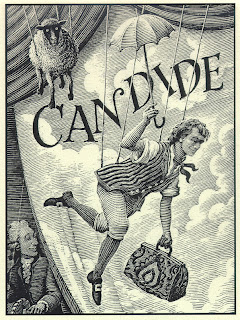Our world is unfair. Our world doesn't always respond the way we want to. Many times unexpected and cruel things happen to good people who do not deserve it. The world is all but predictable. We can protect and prevent disasters or diseases, but we never know who will die everyday, at least not until it happens. People are still going to die. However, who is there to blame? Who is the one who makes planet earth so unfair? On earth, we can find two things, those we can control and conquer, and those we cannot control or conquer.
The ironic part of Candide is that not
"everything is for the best in this world of ours" (Pg. 27) and we
don't live in "the best of all possible worlds."(Pg. 20) Yet, we are
the ones responsible for making our world a horrible place. Many people live
miserably, why do you think people commit suicide each day? The answer is very simple."I
have met a vast number of people who detested their existence" (Pg.
57)
We are the ones who make our world unfair. Ana Maria
Villaveces, wrote in her blog, "As a species, we tend
to want equality but still hope the best is given to us, we enjoy as other
people suffer as long as this doesn’t affect the way we live." We are
ambitious and cruel creatures making our world that way, we do not care about
what happens to others, just to us. That’s one of the reasons our world is that
way, because we are selfish, only seeking for personal pleasure. People
only sit down and wines about how horrible their life has been, but never
realize what took there. "He did not dare to say he was his wife
because in fact she was not. He did not dare to say she was his sister, because
that was not true either...his soul was too pure to commit such treason against
truth" (Pg. 59) Candide only had a drop bad luck, he is an innocent and
virtuous person who honestly didn't deserve to go through so much trouble. The
same goes to James, Dr. Pagloss, Lady Cunégonde, or the Old Lady, all good
people.
Our world isn't atrocious. We make it that way, which is what seems to be portrayed in a satirical manner in Candide. People can suffer
from incidents caused by nature, but there is no one to blame. It’s no one's
fault that those things happen. We cannot control some things, and that's just
life.



